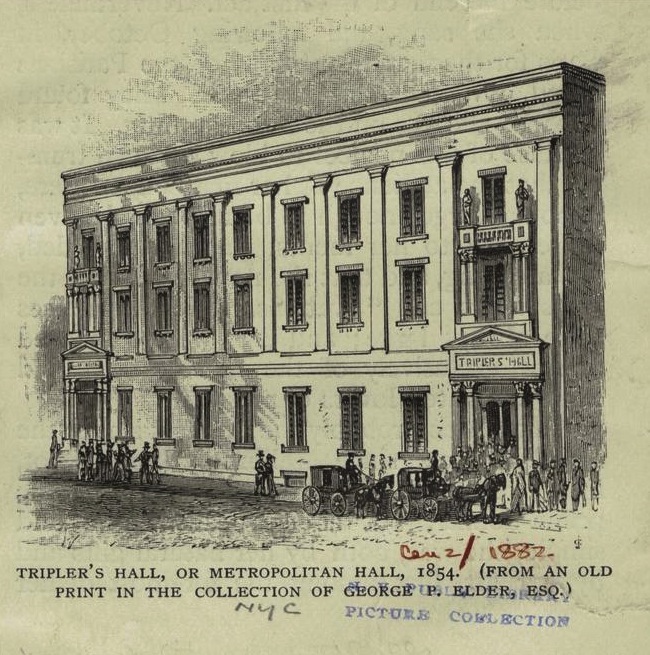Success, Struggles, and Sorrows: The 1850s

I. Maturity and Its Attendant Sorrows
In the decade of the 1850s, all six surviving Burleigh siblings were in their full adulthood, and the five public-facing brothers were nationally famous. Charles, William, and Lucian all came to the aid of Anti-Slavery and Temperance societies in western states during this decade - western Pennsylvania, Ohio, Indiana, Michigan, Illinois, and Wisconsin. George's literary accomplishments were lauded far and wide, and his and William's poetry were widely reprinted. Sadly, Cyrus would not survive the decade, but he reached the pinnacle of his activism and editorial leadership between 1850 and 1854.
The Temperance movement was reaching a pinnacle - or so its advocates thought - of success through promulgating the Maine Prohibitory Law, that banned the sale of liquor. The Anti-Slavery movement, while making substantial progress, was also fraught with crises due to the Fugitive Slave Law and the Kansas-Nebraska Bill.
Then there were the painful losses - mother Lydia in 1853, and Cyrus in 1855. It is a sign of how searing the losses were, that Charles shared his personal letter about his mother's death with the readership of The Liberator, and retained a lock of Cyrus's hair for the remainder of his own life.
II. Anti-Slavery Currents and Crosscurrents
The tumultuous 1850s were marked by the increasing polarization of the country around the issue of slavery - the South was deeply entrenched economically and ideologically in maintaining and extending the institution of slavery, while the North was moving towards the position that Abolitionists had maintained for two decades, to end the scourge of dehumanization. Key incidents include the Fugitive Slave Law, the "rescue" of Black people captured by slave-hunters in the North, the widespread popular success of Harriet Beecher Stowe's Uncle Tom's Cabin, the Dred Scott decision, Bleeding Kansas, the rise of the Republican party, and the raid on Harper's Ferry by John Brown and his inter-racial guerilla fighters. Each of these was a dramatic event, and for those in editorial seats like Charles and Cyrus Burleigh, it was incumbent upon them to respond. There was also a need for many micro-actions, especially as the Underground Railroad increased in its importance with the Fugitive Slave Law.
There were also the tensions felt by Abolitionists like Charles who had embraced peace principles. They could feel the move towards full-scale bloodshed, even before John Brown made it explicit. One incident in which Charles was involved - rescuing an enslaved child from a railroad car in Ohio - made these questions physically real for Charles, as did his joining in the celebration of the Jerry Rescue in Syracuse.
From the Burleigh family perspective, the 1850s were also a time of great sadness. The loss of Lydia Bradford Burleigh in 1853, mother of the core generation of siblings, was a very difficult one, both for the love the family bore her, and because it left Lucian and Mary with an even more burdensome task of elder care for their father. The early death of Cyrus Moses Burleigh at just 35 years of age, was a particularly difficult loss for Charles, who had worked closely with him as a brother, mentor, and fellow-laborer in Pennsylvania.
Mary finally found a mate in Jesse Ames, whom she married in 1854. Very little is known yet about their courtship and marriage, or Jesse's personality and life story.
William, bruised by the partisan battles among the Abolitionists, turned his full-time attention to Temperance, working for the New York State Temperance Society as an agent and editor. Charles also pulled back from editing, returning to Plainfield in the 1850s, but remaining quite active as a speaker and author.
III. Unifying Moments
One event brought many of the siblings together. Minimally, Lucian, Cyrus, William, Charles, and his wife Gertrude, were all in attendance at the Whole World's Temperance Convention at Metropolitan Hall on September 2, 1853. William Burleigh was among the speakers. Susan B. Anthony participated among the Convention's officers - as one of the secretaries, of course! The other surviving siblings - Mary and George - could well have been in attendance, too, as both were committed to the Temperance cause, especially noteworthy as a theme in George's poetic oeuvre.
They had also been together at Christmas in 1852.
MORE WILL BE



